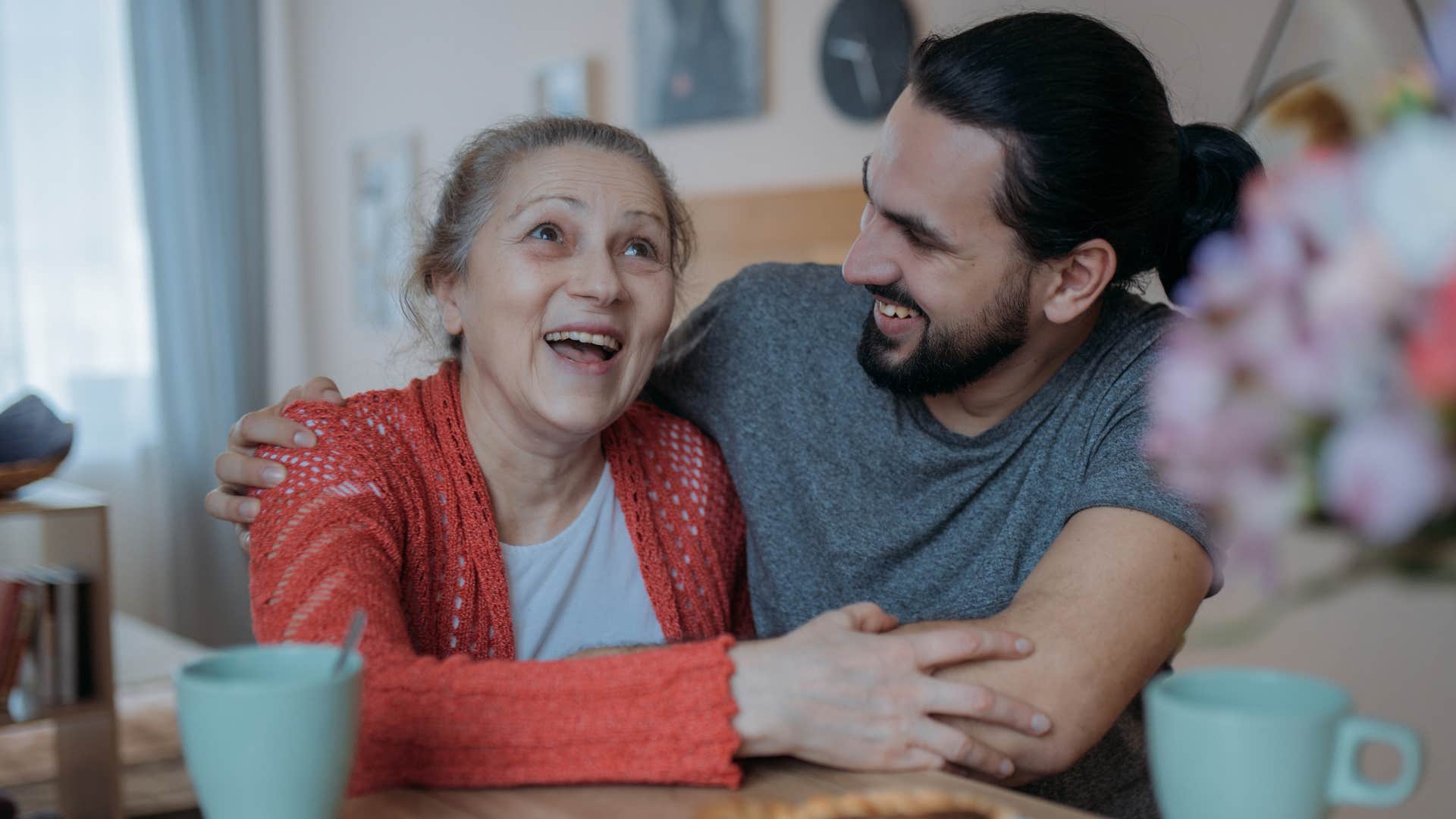12 Phrases Bad Parents Say To Their Adult Kids Way Too Often
Even into adulthood, cultivating a safe space for open communication and affection within families is important.
 Fizkes | Shutterstock.com
Fizkes | Shutterstock.com Toxic parents generally don't adopt their dismissive tendencies and narcissistic mindsets when their children reach adulthood; rather, they engrain them into their parenting styles throughout their children's early lives.
According to a study from the Pakistan Journal of Medicine Sciences, this psychological manipulation generally sparks mental health concerns in bad parents' children, sabotaging healthy communication and boundaries when they do reach adulthood. Of course, these conversations are founded on phrases bad parents say to their adult kids way too often, sparking mistrust and resentment that are incredibly taxing to unlearn.
Here are 12 phrases bad parents say to their adult kids way too often
1. 'You're not doing enough'
 Fizkes | Shutterstock.com
Fizkes | Shutterstock.com
Adult kids not feeling like they're "enough" in their parents' eyes can stem from a variety of things, from unresolved childhood trauma, to lacking boundaries, and unsolicited advice.
However, healthy parents often use simple conversations and passing interactions to ensure they're kids never feel judged, starting with celebrating their small wins.
While toxic parents might try to misuse phrases like "You're not doing enough" to spark misguided motivation in their kids, great ones use supportive language to build up their self-esteem.
2. 'Why aren't you like them?'
 Fizkes | Shutterstock.com
Fizkes | Shutterstock.com
According to experts at Narayana Schools, comparing children with others often sparks negative self-esteem and resentment in family dynamics, even for households with adult kids.
Many young adults today are already coping with feelings of competitiveness and envy in their lives, whether in relationships or at work; they don't need another venue to spark those uncomfortable feelings.
Instead, celebrate their wins and cultivate a safe space to offer suggestions for their life when you're asked for input as a parent. Not everyone defines success in the same way, and even if your child is struggling, there's something to be proud of.
3. 'I guess I'm a bad mom'
 Fizkes | Shutterstock.com
Fizkes | Shutterstock.com
Especially common for parents of Gen Z and young millennial adults, who are largely coming to terms with the connection between their adult struggles and personal childhood experiences, it can be difficult to accept and support emotions founded on experiences that you might not agree with.
If your child comes to you to discuss their childhood, arguing that they're struggling because of your relationship or a traumatic event from their childhood, defensiveness is never the answer.
Find ways to support these complex emotions in your adult kids, even if you don't agree with them or remember an experience in the same way. If they feel comfortable enough to discuss it with you, there's a foundation for growth in your relationship already.
4. 'You have it so much easier than I did'
 Fizkes | Shutterstock.com
Fizkes | Shutterstock.com
When people feel heard and understood in their relationships, whether that's with a parent or a partner, they generally have a much healthier relationship, at least according to a study from the Journal of Humanistic Psychology.
However, phrases bad parents say to their adult kids way too often brings a sense of hostility to conversations that can sabotage that safe space.
Instead of dismissing your kids' struggles with a phrase like "You have it so much easier than I did" or trying to compare your early adulthood with theirs, consider being a shoulder to lean on.
Find ways to support them without trying to "solve" their problems or subtly judge their emotions — that's how you find the balance of a healthy parent-child relationship.
5. 'Welcome to adulting'
 Amnaj Khetsamtip | Shutterstock.com
Amnaj Khetsamtip | Shutterstock.com
Bad parents have a tendency to be dismissive, especially towards their children's emotions. While it stems from their own need for attention and generally narcissistic tendencies like avoiding accountability and discomfort, the toxic phrases bad parents say to their adult kids way too often manifest in a million different ways.
If your adult child is struggling or coming to you to vent, don't dismiss them with a phrase like "Welcome to adulting."
While experts like counselor Dr. Rachel Glik argue that it might be occasionally uncomfortable, especially if your child is venting about their own childhood, continuing to listen to their emotions without judgment or degrading comments can make all the difference in a healthy relationship.
6. 'You need to do this'
 Prostock-studio | Shutterstock.com
Prostock-studio | Shutterstock.com
A large cause of resentment in parents from their adult children is their tendency to dish out unsolicited advice, instead of asking a question like, "Are you looking for a listening ear right now or would you like solutions?"
Like psychologist Judith Tutin admits, even if you're struggling as a parent to view your child in their adult identity, that doesn't make them any less grown.
Let them come to you for advice; otherwise, serve as the safe, supportive, and comfortable parent they're leaning on for sheer emotional support and listening.
7. 'You don't have a choice'
 Fizkes | Shutterstock.com
Fizkes | Shutterstock.com
Attempting to control an adult child's choices is not only the sign of an overbearing parent, but a generally bad one.
Instead of letting their kids find their way in the world, deal with their own struggles, and form their own identities, they continue to overstep boundaries that protect the health of their relationships.
Adult children know themselves better than their parents — especially toxic ones — and can make their own decisions in their lives.
8. 'Why don't you ever come home?'
 Grusho Anna | Shutterstock.com
Grusho Anna | Shutterstock.com
Feeling inherently entitled to their adult kids' time, energy, and presence, many bad parents will use phrases like this as a means to guilt-trip and compensate for their uncomfortable emotions of envy, guilt, and sometimes grief over the absence of their child at home.
According to psychologist Lynn Margolies PhD, bad parents who rely on guilt-tripping generally lack self-awareness, are confused with their emotions, and are desperately looking for a way to cope with their discomfort.
Oftentimes, they view a child's autonomy and adult lives as a direct cause of their own suffering, sparking these toxic comments.
9. 'You like your new life better than us'
 Chokniti Studio | Shutterstock.com
Chokniti Studio | Shutterstock.com
It can be hard to take on a new role in a relationship that's been all-consuming for the last few decades. And, oftentimes, this shift in parent-child connections into adulthood is an entirely new dynamic for everyone involved.
Of course, it's not going to be easy, and struggling with the transition doesn't make you a bad parent. However, bad parents do tend to let their frustration and sadness manifest into guilt-tripping and shame, directed at their adult children.
Instead of letting their adult children live their adult lives, they guilt them into coming home or attack their adult autonomy in an effort to draw their attention back to them.
10. 'You don't know what you're talking about'
 Fizkes | Shutterstock.com
Fizkes | Shutterstock.com
According to a Pew Research Center report, nearly 20% of parents believe their relationship with their adult children is "average to poor," often stemming from constant conflict, disagreements, and lacking boundaries.
When toxic parents use phrases like this, they're not only undermining the maturity and intellect of their kids, but breaking down avenues for healthy and open conversations.
11. 'You're just immature'
 Fizkes | Shutterstock.com
Fizkes | Shutterstock.com
Outside of simply struggling to see their children in their autonomous adult identities, many toxic parents project their own insecurities onto their adult kids to find a sense of comfort in their own lives.
By utilizing a phrase like this in conversation, parents can inadvertently assert their dominance over their adult kids, even at the expense of the health of their relationship. Phrases like this only spark disconnected family dynamics, where adult kids feel unheard and unappreciated by their parents for things they can't change.
12. 'I don't need to apologize to you'
 ViDI Studio | Shutterstock.com
ViDI Studio | Shutterstock.com
Many toxic parents, especially those with narcissistic tendencies, tend to shift blame away from themselves and onto their children to protect their own image and emotional stability.
Instead of addressing their hurtful comments or apologizing for their mistakes, they dismiss them, leading to feelings of resentment in their family dynamics.
With unresolved resentful feelings and generally toxic modes of communication, parents with adult kids struggle to maintain a healthy balance with appropriate boundaries.
Zayda Slabbekoorn is a staff writer with a bachelor's degree in social relations & policy and gender studies who focuses on psychology, relationships, self-help, and human interest stories.

